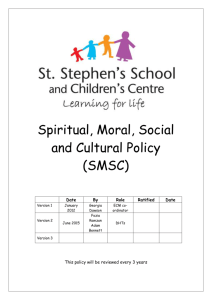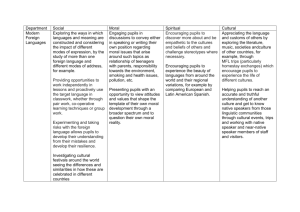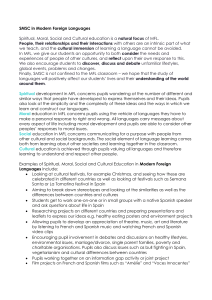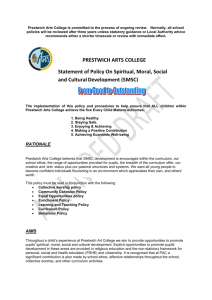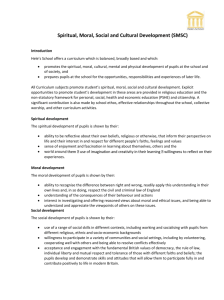This policy takes full account of the school's legal obligations and
advertisement
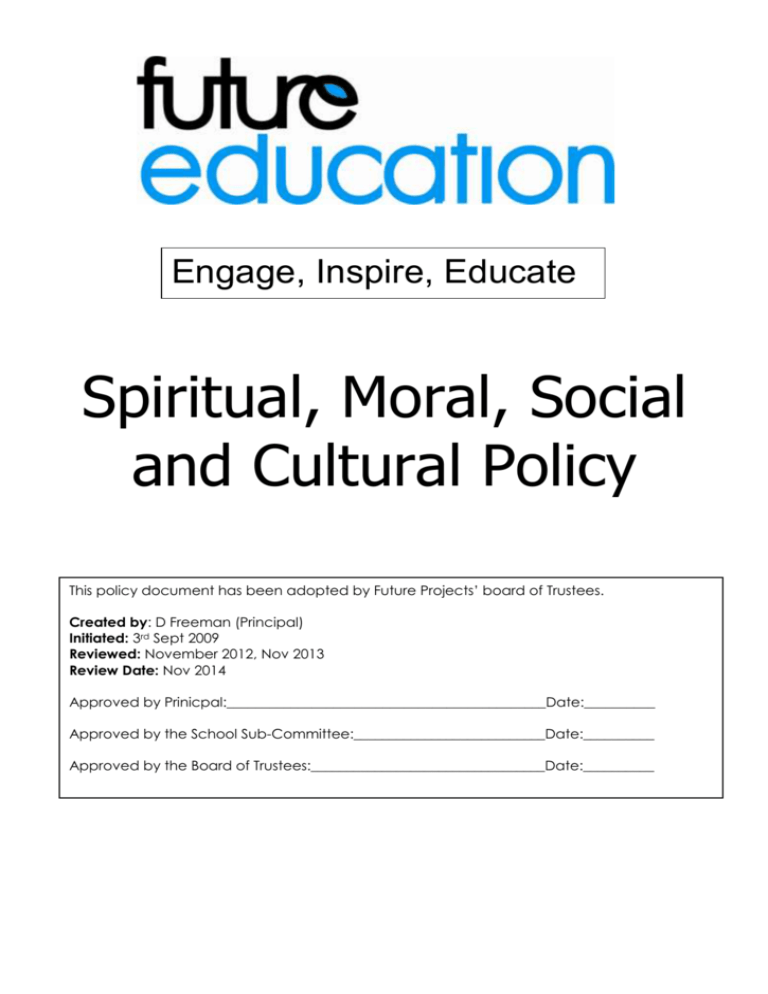
Engage, Inspire, Educate Spiritual, Moral, Social and Cultural Policy This policy document has been adopted by Future Projects’ board of Trustees. Created by: D Freeman (Principal) Initiated: 3rd Sept 2009 Reviewed: November 2012, Nov 2013 Review Date: Nov 2014 Approved by Prinicpal:_____________________________________________Date:__________ Approved by the School Sub-Committee:___________________________Date:__________ Approved by the Board of Trustees:_________________________________Date:__________ Spiritual, Moral, Social and Cultural Policy This policy takes full account of the school’s legal obligations and the latest Ofsted/HMI Guidance. Spiritual, Moral, Social and Cultural (SMSC) Development is crucial for individual pupils and it is crucial for society as a whole. Most teachers would see it as the heart of what education is all about - helping pupils grow and develop as people. This importance has repeatedly been recognised by legislators; schools are required by law to promote pupils’ SMSC development and inspectors are required to inspect it. (Ofsted 2004) Why we are interested in pupils’ SMSC development? The statutory requirement that schools should encourage pupils’ SMSC development was first included in the Education Reform Act 1988. The Act began as follows: ‘The curriculum for a maintained school (must be) a balanced and broadly based curriculum which: Promotes the spiritual, moral, cultural, mental and physical development of pupils at the school and of society, and Prepares such pupils for the opportunities, responsibilities and experiences of adult life.’ The Act clearly recognised that there is more to life than achieving high standards in academic subjects. The task was described as: ‘…the training of good human beings, purposeful and wise, themselves with a vision of what it is to be human and the kind of society that makes that possible’. Today, the responsibility of educators and others in the importance of encouraging pupils’ SMSC development remains strong. Whether talking about the family, teenage pregnancy, the misuse of drugs, ethics in business or politics, football hooliganism, homophobia, the promotion of good race relations, the consequences of social disadvantage, a failure to vote at elections, or the host of other issues which raise spiritual, moral, social and cultural issues, the debate very quickly turns to schools and the role they can play. There have been recent, significant, national initiatives in personal, social and health education (PSHE), citizenship, sex and relationship education (SRE), drug education, and careers education and guidance, all of which are linked to pupils’ SMSC development. Recent legislation on race equality, special educational needs, disability, sexual orientation, religion and age has significant links to pupils’ SMSC development. Schools have a statutory duty to ensure that pupils are not discriminated against and to promote good race relations. Schools must have regard to guidance set out in codes of practice issued by the Commission for Racial Equality, the Department for Education and Skills and the Disability Rights Commission In our school we have policies to support many of these national initiatives: Equal Opportunity and Race Equality and Diversity Policy SMSC Policy 2/4 Drugs Policy Anti-Bullying Policy Child Protection Policy Exclusion Policy Safe Guarding Children and Safer Recruitment Policy Spiritual, Moral, Social and Cultural development defined. Spiritual Development: This is difficult to define. Ofsted attempted to define it as a development that relates to that aspect of inner life through which a pupil acquires insight into their personal experience which is of enduring worth. Spiritual is not synonymous with religion, but is about how we as a school can help the individual make sense of their experiences. Moral Development: Moral development is about the building, by pupils, of a framework of moral values, which regulates their personal behaviour. It is also about the development of pupils’ understanding of society’s shared and agreed values. It is also about understanding that society’s values change, the reasons for these changes and developing an opinion about different views. Social Development: Social development is about young people working effectively with each other and participating successfully in the community as a whole. It is about the development of the skills and personal qualities necessary for living and working together effectively in a multiracial and multi-cultural society. It also involves the development of the inter-personal skills necessary for successful relationships. Cultural Development: Cultural development is about pupils’ understanding their own culture and other cultures in their town, region and in the country as a whole. It is about understanding cultures represented in Europe and elsewhere in the world. It is about feeling comfortable in a variety of cultures and being able to operate in the emerging world culture of shared experiences. Promoting pupils’ cultural development is intimately linked with the schools’ attempts to value cultural diversity and prevent racism. Opportunities for pupils to experience and learn about Spiritual, Moral, Social and Cultural Development in our school The spiritual, moral, social and cultural elements of pupils’ development are inter-related. Attempting to disaggregate them is helpful for the purpose of analysis and also inspection and school self-improvement. But it should not be forgotten that there is much overlap between them, not least in respect of spirituality and its links to pupils’ attitudes, morals, behaviour in society and cultural understanding. SMSC Policy 3/4 It is an expectation at Future Education that all staff, in all subjects, can and should make a contribution to the Spiritual, Moral, Social and Cultural Development of pupils through the taught curriculum and through the use of appropriate teaching and learning strategies e.g. discussion, reflection, pupil participation etc The main thrust of SMSC discussions will take place during Citizenship/PSHE lessons. However, all subjects contribute to SMSC and staff should make themselves aware of the specific areas within their schemes of work when this occurs and to devote appropriate time for discussions on issues raised. SMSC Policy 4/4


